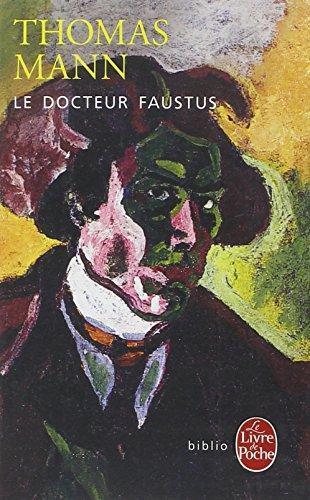Julia_98 reviewed Le Docteur Faustus by Thomas Mann
Composing with the Devil: My Descent into Doktor Faustus
4 stars
Reading Doktor Faustus by Thomas Mann felt like climbing into a cold, cerebral labyrinth—with no guarantee of coming back whole. At its center is Adrian Leverkühn, a composer who trades his soul for artistic genius. But this is no flashy Faustian bargain. It’s slow. Clinical. And terrifyingly plausible. Mann fuses dense intellectualism with creeping dread, and I often felt like I was wading through quicksand made of philosophy, music theory, and theology.
The novel is narrated by Leverkühn’s friend Serenus Zeitblom, a cautious, moral man chronicling the life of a genius consumed from within. Zeitblom’s tone is restrained, but through it, I could feel the chill of Leverkühn’s isolation, his detachment, and ultimately his collapse. The pact with the devil is framed not just as a personal tragedy but a national one—mirroring Germany’s own moral decay leading up to the rise of Nazism. That parallel haunted me throughout.
…
Reading Doktor Faustus by Thomas Mann felt like climbing into a cold, cerebral labyrinth—with no guarantee of coming back whole. At its center is Adrian Leverkühn, a composer who trades his soul for artistic genius. But this is no flashy Faustian bargain. It’s slow. Clinical. And terrifyingly plausible. Mann fuses dense intellectualism with creeping dread, and I often felt like I was wading through quicksand made of philosophy, music theory, and theology.
The novel is narrated by Leverkühn’s friend Serenus Zeitblom, a cautious, moral man chronicling the life of a genius consumed from within. Zeitblom’s tone is restrained, but through it, I could feel the chill of Leverkühn’s isolation, his detachment, and ultimately his collapse. The pact with the devil is framed not just as a personal tragedy but a national one—mirroring Germany’s own moral decay leading up to the rise of Nazism. That parallel haunted me throughout.
This wasn’t a book I read quickly—or comfortably. Mann doesn’t allow that. I wrestled with it. I felt intellectually inadequate at times, overwhelmed by references and abstract discussions. But every so often, there’d be a moment of piercing clarity—a line or idea that hit like thunder. Those moments made the struggle worth it.
What lingered most wasn’t the pact, but the silence that followed—the music that never got written, the warmth that never returned. Doktor Faustus left me unsettled, and that feels right. It’s not meant to soothe. It’s meant to challenge, to provoke, to make you sit with discomfort.
I didn’t just read Doktor Faustus—I survived it. And I’m still thinking about what it took from me.

